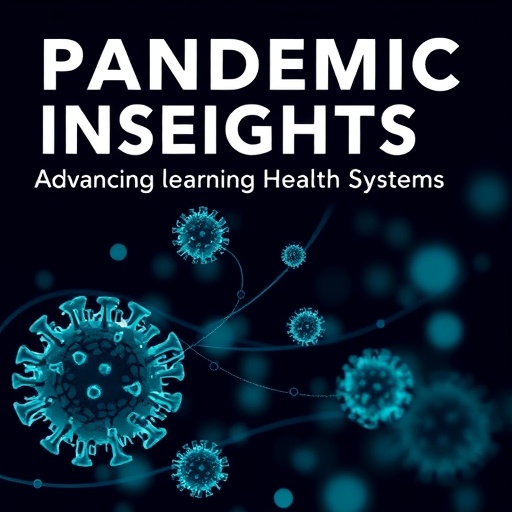The global health landscape has undergone seismic shifts in the wake of the COVID-19 pandemic, prompting a reevaluation of how healthcare systems function and evolve. In an insightful new study, J.K. Benzer, M.P. Charns, and S.J. Singer explore the intersection of organization theory with the dynamics of Learning Health Systems (LHS). Their research lays bare the complexities and challenges faced during the pandemic and proposes actionable solutions to enhance system resilience moving forward.
Learning Health Systems represent an innovative framework designed to promote continual learning and improvement within healthcare settings. Traditionally, these systems aim to adapt reliably to new information and change, facilitating real-time adjustments to practices and protocols based on the latest data. However, the pandemic exposed significant vulnerabilities in many of these systems, particularly regarding their ability to integrate knowledge swiftly and effectively across diverse healthcare environments.
The researchers commence their exploration by dissecting the setbacks encountered by healthcare organizations during the pandemic. These challenges ranged from overwhelmed hospital systems to flawed communication protocols, which highlighted the scarcity of agile responses in critical and rapidly changing circumstances. The inability of some healthcare providers to transition to new protocols based on emerging research showcased the importance of fostering a culture of adaptability.
An essential aspect of their study lies in applying organization theory to understand how structural elements within healthcare can either facilitate or hinder the learning process. Organization theory offers valuable insights into the behavior of groups and organizations, focusing on how these entities can evolve to meet external pressures. The researchers suggest that applying principles of organization theory could help healthcare entities devise more robust frameworks geared towards sustained learning and adaptability.
The analysis conducted in this study draws on real-time data and testimonials collected throughout the pandemic, adding a rich qualitative dimension to their findings. The researchers catalog the experiences of frontline workers who encountered various barriers — from bureaucratic inertia to resource limitations — that stymied effective learning and adaptation during times of crisis. It is evident that these lessons underscore the need for systematic changes in how health organizations approach learning.
Moreover, the study sheds light on the necessity for establishing inter-organizational collaborations that can foster knowledge transfer and collective learning. The formation of networks that bring together different health entities allows for sharing best practices and innovative solutions developed amidst the chaos of the pandemic. The collaborative spirit could serve as a catalyst for developing more resilient systems capable of weathering future public health emergencies.
The authors argue that integrating technology into Learning Health Systems can greatly enhance their performance. Advances in data science, machine learning, and artificial intelligence provide unprecedented opportunities for real-time decision-making and outcome prediction. This technological infusion can revolutionize how healthcare systems analyze trends, providing a constantly updated foundation for learning and adaptation.
One of the compelling arguments presented in the study is the need to engage patients as active participants in their healthcare journeys. By fostering a patient-centered approach that values feedback and patient experience, health systems can gain insights that help shape procedures and interventions. Empowering patients not only enhances health outcomes but also creates a fertile ground for continuous learning.
The proposal for incorporating training modules based on the principles of organization theory is another critical component of the study. By equipping healthcare professionals with skills and knowledge on effective collaboration, leadership, and adaptive strategies, organizations can prepare their workforce better to respond to dynamic health challenges. When practitioners are trained to recognize and utilize the learning potential inherent in their environments, they become pivotal agents of change.
Despite the lessons learned, the journey of fortifying Learning Health Systems is fraught with challenges. The study candidly acknowledges potential resistance to change, particularly within entrenched organizational cultures. It emphasizes the importance of leadership commitment to cultivating a growth mindset throughout healthcare networks, which includes redefining success metrics to value learning, collaboration, and system-wide resilience.
The research poignantly concludes by reiterating that the experiences of the pandemic should not be viewed merely as setbacks but as critical learning opportunities. The principles derived from organizational theory offer an invaluable lens through which healthcare systems can reimagine their approaches to learning and growth. By committing to a paradigm shift that embraces continuous learning, organizations can emerge stronger, more agile, and better equipped to address the multifaceted challenges of the future.
Ultimately, this research contributes significantly to the broader conversation about healthcare reform. As the world grapples with the enduring consequences of the pandemic, it becomes imperative to apply these insights toward constructing learning systems that not only respond better during crises but also proactively advance health equity and care quality in everyday practice. The path forward is paved with the fundamental understanding that healthcare is not merely about curing illness but about continually adapting and evolving alongside society’s needs.
Emphasizing the critical need for adaptive frameworks in healthcare, this study stands as a clarion call for stakeholders to collectively work towards building systems that prioritize learning. By harnessing both theoretical insights and practical strategies, this research articulates a roadmap for future healthcare improvements that can withstand the tests of time and crisis. The time for collaborative, learning-oriented approaches has arrived, urging health organizations to evolve beyond what was previously conceivable.
As the saga of health systems continues, collaboration, learning, and adaptation may indeed become the linchpin of success in navigating the challenges of the future landscape.
Subject of Research: Enhancing Learning Health Systems Post-Pandemic
Article Title: Building on Advances in Learning Health Systems from the Pandemic: Insights from Organization Theory, Challenges, and Potential Solutions
Article References:
Benzer, J.K., Charns, M.P., Singer, S.J. et al. Building on Advances in Learning Health Systems from the Pandemic: Insights from Organization Theory, Challenges, and Potential Solutions.
J GEN INTERN MED (2025). https://doi.org/10.1007/s11606-025-09970-0
Image Credits: AI Generated
DOI: https://doi.org/10.1007/s11606-025-09970-0
Keywords: Learning Health Systems, COVID-19, organization theory, healthcare adaptability, patient-centered care, inter-organizational collaboration, technology in healthcare, workforce training, resilience in healthcare.




